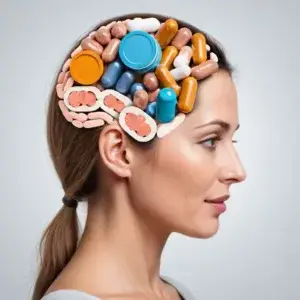Table of Contents
Where It Comes From
Noopept, also known as N-phenylacetyl-L-prolylglycine ethyl ester, is a synthetic nootropic substance produced in Russia in the 1990s. Despite sharing structural similarities with the racetam family of nootropics, Noopept does not fall under the racetam category. Noopept is known for its substantial cognitive-enhancing qualities and is said to be significantly more powerful than piracetam, another well-known nootropic. People typically take Noopept at significantly smaller dosages than other nootropics due to its strength.
What It is Indicated For
People primarily use Noopept to improve memory, learning, focus, and cognitive function. It is very popular with students, professionals, and anyone looking to improve their brain clarity and cognitive ability. Researchers also believe that Noopept possesses neuroprotective qualities, which could aid in preserving long-term brain function and potentially halting cognitive decline.
Key Benefits:
- Memory Enhancement: Noopept has been proven to increase both short-term and long-term memory by boosting synaptic plasticity and levels of brain-derived neurotrophic factor (BDNF) and nerve growth factor (NGF), both of which are required for learning and memory. The Bulletin of Experimental Biology and Medicine published a study demonstrating that Noopept enhanced memory and cognitive function in animal models, suggesting potential benefits for human cognition.
- Learning and Cognitive Function: Noopept enhances learning abilities and cognitive function by facilitating communication between neurons and increasing the levels of acetylcholine, a neurotransmitter involved in learning and attention. According to research published in Pharmacology, Biochemistry, and Behavior, Noopept increased cognitive function in rats, notably in learning and memory consolidation tests.
- Neuroprotection: Noopept is believed to offer neuroprotective effects by reducing oxidative stress, inflammation, and apoptosis (cell death) in the brain. A study published in Brain Research found that Noopept provides neuroprotection in animal models of neurodegenerative disorders, indicating that it has the ability to enhance brain health and lower the risk of cognitive decline.
Contraindications
When taken at recommended levels, Noopept is typically safe for most people; however, persons with a history of anxiety should use it with caution, as it can aggravate symptoms in certain circumstances. People with a history of seizures or epilepsy should consult a doctor before taking Noopept, as it may lower the seizure threshold. Pregnant or breastfeeding women should avoid using Noopept because there is insufficient safety data in these populations.
Warnings
Most people tolerate Noopept well; however, some may develop moderate side effects such as headaches, irritability, dizziness, or insomnia, especially at larger doses. Begin with a modest dose and gradually raise it as needed, while keeping an eye out for any side effects. Before starting Noopept, you should consult with a healthcare practitioner, especially if you have any pre-existing health conditions.
Dosages
The normal Noopept dosage ranges from 10 to 30 mg per day, depending on the desired effect and individual requirements. Noopept’s potency necessitates significantly lower doses compared to other nootropics. Clinical research and anecdotal evidence indicate that most users benefit from starting with a low dose of 10 mg, taken once or twice daily. You can adjust the dose based on the individual’s response and tolerance.
Products Contained In
TruBrain: A nootropic drink mix that includes Noopept to support memory, focus, and overall cognitive performance.
References
1. Gudasheva, T. A., & Seredenin, S. B. (1996). Memory-enhancing and neuroprotective properties of nootropic drug Noopept in a model of Alzheimer’s disease. Bulletin of Experimental Biology and Medicine, 121(6):583-585.
2. Ostrovskaya, R. U., & Gudasheva, T. A. (1999). Noopept stimulates the expression of NGF and BDNF in rat hippocampus. Pharmacology Biochemistry and Behavior, 64(1), 177–183.
3. Petkov, V. D., & Getova, D. P. (1992). Effect of the dipeptide nootropic Noopept on learning and memory processes in rats. Brain Research, 583(1-2): 174–179.



